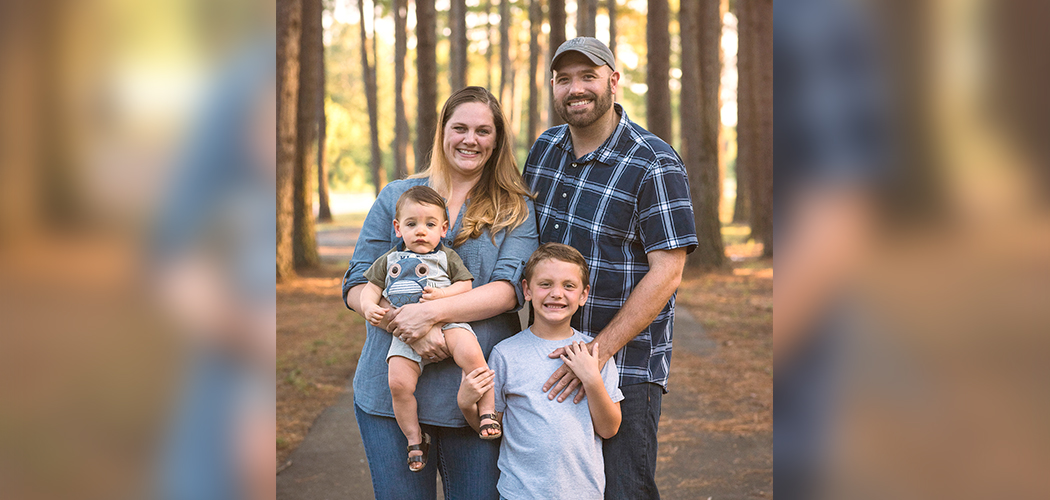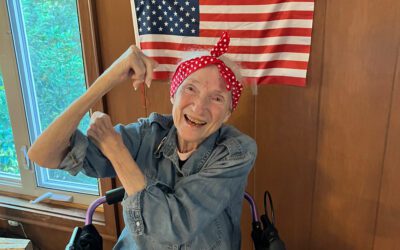[title subtitle=”words: Marla Cantrell
images:courtesy Ashley McFaul via AFSP”][/title]
The decision to have a second child came after many heartfelt talks, a lot of pondering, and much introspection. Nichol and Matt Goines understood there would be risks. Their first son, Mason, was born prematurely at Mercy Hospital in Fort Smith, Arkansas, just a week after the Ronald McDonald Family Room opened in December 2010. At that time, the couple knew little of the four-bedroom luxury apartment that fills 3,200 square feet on the fourth floor of the hospital and serves families in crisis free of charge.
But after Nichol developed complications due to a syndrome named HELLP, in her thirty-third week of pregnancy, she was rushed into surgery for an emergency Caesarian section. Thankfully, Mason did well, spending twenty days in the Neonatal Intensive Care Unit as he grew stronger. Nichol and Matt learned of the Ronald McDonald Family Room during that time, finding comfort there, and eating meals they might otherwise have skipped.
Once Mason was home, the reality of what had happened set in. HELLP affects between 0.2 and 0.6 percent of expectant mothers and is an acronym that stands for Hemolysis (the rupturing of red blood cells), Elevated Liver enzymes, and Low Platelet count. The malady can be life-threatening to both mother and child.
Still, she longed for another baby. When she brought up the subject with Matt, he voiced his concerns, worrying that he might lose the woman he’d loved since high school. The couple waited four years before trying, and in 2014 they found out they were going to be parents again.
On February 7, 2015, when Nichol was thirty-three weeks into her pregnancy just as she’d been when Mason was born, she woke thinking she might have the stomach flu. In fifteen minutes, she was in severe pain. She’d suffered a placental abruption, which means the placental lining had separated from the uterus. Typically, a woman will hemorrhage, but due to the location of the tear, Nichol’s bleeding was internal.
The trauma caused her blood pressure to skyrocket, and she passed out on the surgery table. Fluid had built up in her eyes, causing temporary blindness in one eye and diminished sight in the other. When her second son, Miles, was delivered, he was stillborn, and they were devastated.
Nichol and Matt spent that day saying good-bye to their precious little son, in a room in a special section of the hospital. He weighed one ounce more than his big brother had at birth.
“Probably the second worst thing I’ve gone through is having to tell Mason we weren’t coming home with his little brother,” Nichol says. “He was four. He didn’t understand. We’d tell him his brother was with Jesus, and he’d ask when he was coming back. He was so sweet. He’d say, ‘It’s OK, you still have me.’”
So many people offered comfort, including Nichol’s OBGYN, Dr. Timothy Bell. “Dr. Bell couldn’t have been kinder. The day of the service, his wife came to my house to bring food, and I cried and cried. There was nothing anyone could have done to prevent this, but just having a doctor like that meant everything.”
Nichol’s sight returned to normal in two months, but she had other problems. Her kidneys had been affected, something she learned a bit later, and a condition she deals with even today. Grief, ocean waves of it, hit as regularly and as fiercely as the tide. “I’d cry in the shower. I’d cry in bed after Matt went to sleep; I didn’t want him to see me like that. And then one day I collapsed on the bedroom floor, sobbing, and he heard me, and he came and held me in his arms.
“He told me to cry all I needed, that he was crying too. He told me he’d do anything for me.”
At that time, Nichol was avoiding people. She wondered if her sorrow showed in the way she carried herself, in the sadness that preceded her into every room. She joined an online support group, and read other mothers’ stories to see how they’d made it through. She wondered if volunteering to hold babies in the NICU at Mercy might help. “I knew I was stuck. I didn’t want my son to think we’d lost the baby and now he was going to lose me too.”
Some closest to her thought it was a bad idea, that it would crush her already weary spirit, but she was determined. Nichol signed up, and in April, two months after her loss, she went to the hospital and steeled herself.
“I made it to the third floor. The elevator dinged, and I couldn’t get off. I was paralyzed. The elevator shuts, goes to the next floor, and I walk off sobbing. I walked down the hall, and there was the Ronald McDonald Family Room. I’d managed to calm down by then. Emma Johnson, the Room’s manager, was there, and I asked if they needed volunteers, and she said they could always use help.”
At that point, Nichol let go, telling Emma that the Room was where she would have ended up if Miles had survived. Emma wrapped her arms around Nichol, and let her cry.
Since then, Nichol has sat with moms who were in tears themselves, letting them share their stories, offering hope. She’s cleaned, made beds, but mostly she’s baked. It gives her peace, and she knows how important a warm meal is when you’re watching your child struggle.
“It was so good for me. It made me face my emotions head on. I couldn’t hide from anything while talking to these moms because they had been through some of the same things I had. Grief is a roller coaster; I had good days and bad, but eventually more and more good days and less and less bad.”
Her story could end right here, a lovely tribute to the power of love, the beauty of giving. But this is only the mid-point because as Nichol grew stronger, her desire for another child was overpowering.
Of course, her husband Matt was hard to convince. They’d been through so much. Still, Nichol persisted, meeting with Dr. Timothy Bell, who referred her to Dr. Bernard Canzoneri in Northwest Arkansas who specializes in high-risk pregnancies. With a careful plan in place, she and Matt decided to try again.
“Dr. Bell said, ‘If you want another baby, then I’m here, and we’re going to make it happen. I’m not going to leave you alone.’”
In February 2016, Nichol was pregnant again. Dr. Bell knew she’d be concerned about every twinge, every ache that seemed out of the ordinary. He told her that when concern hit, to call him, or to show up at his office for an ultrasound and heartbeat check. When she was thirty weeks pregnant and her blood pressure rose, he admitted her to Mercy, monitoring her regularly.
On September 27, three weeks after Nichol was admitted, her third son Warren was born. He weighed four pounds five ounces, and he was perfect. He spent ten days in the NICU, and Nichol once again used the Ronald McDonald Family Room.
Nichol laughs as she tells the following part of her story. Her oldest son, Mason, was five when Warren was born. During her pregnancy, they’d asked him what he wanted to name his little brother, and he said, “Volcano Pancake!”
While it was an awesome name, it might have caused a few complications for the little guy, so they opted for Warren, a name that would take him steadily into adulthood.
When Nichol smiles, a dimple shows. Her long blond hair catches the light, and her eyes glimmer, with joy. She returns to the topic of kindness, of that moment when she met Emma at the Ronald McDonald Family Room. That day, she was looking for the other side of heartache. She is filled with gratitude that she found it, a safe shore that looked so far away it might as well have been a mirage. She is grateful that it was something much more concrete, something as real and everlasting as hope.
The Ronald McDonald Family Room at Mercy Hospital in Fort Smith welcomes volunteers, donations, and support.
Also, the Red Shoe Shindig, which supports the Family Room, will be held October 14, at 6pm, at Hardscrabble Country Club. To buy tickets or learn more about volunteering, visit www.rmhcofarkoma.org.




